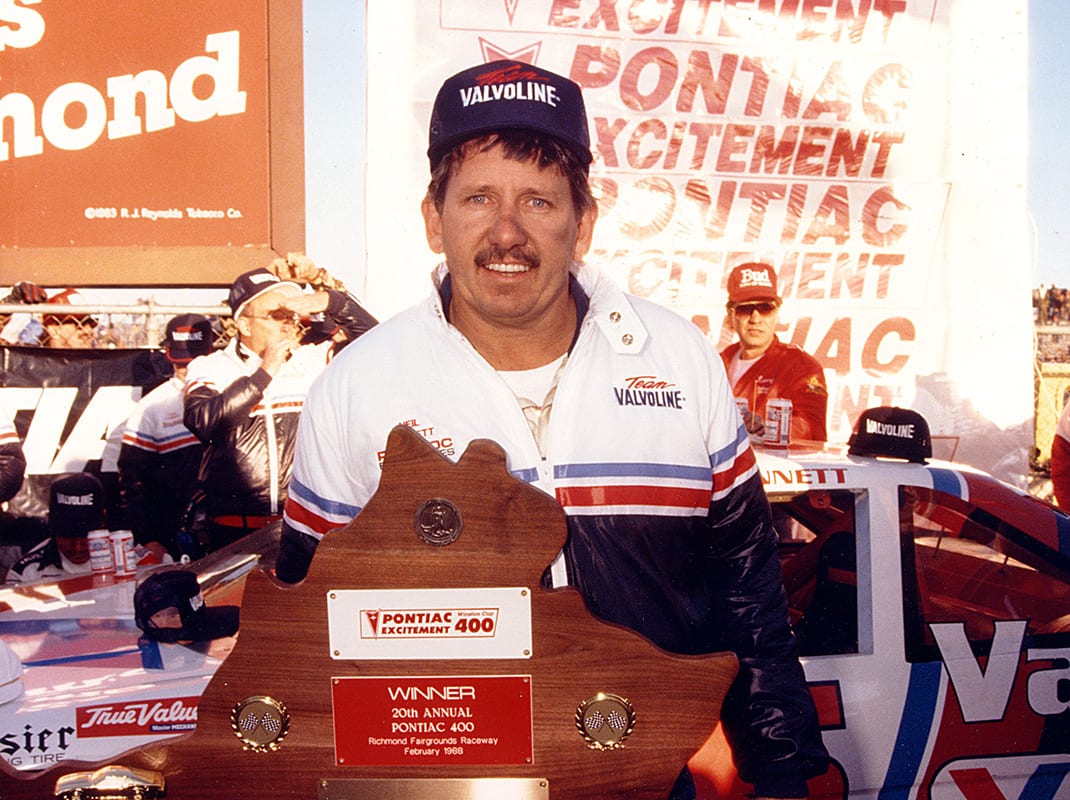Wood’s call granted Bonnett one of the very best rides on the circuit and, as a result, victories came in some of NASCAR’s biggest events, including the 1981 Southern 500 at Darlington and the 1982 World 600 at Charlotte Motor Speedway.
Bonnett was on the radar of legendary driver and team owner Junior Johnson, but it was 1984 before the deal came together. He joined team owners Butch Mock and Bob Rahilly in 1983, winning a second consecutive World 600 and the Atlanta 500 at season’s end.
The move to Johnson’s two-car operation alongside Darrell Waltrip in 1984 lasted through 1986 and produced three victories in three seasons. Bonnett returned to Rahmoc Racing in 1987 and was enjoying a strong season with five top-five finishes and 15 top-10 results when he suffered a broken right leg at Charlotte on Oct. 11, 1987.
Months of rehabilitation followed, but by the start of the 1988 season, Bonnett was back and ready to race. Miraculously, he finished fourth in the Daytona 500 and won in three successive weeks following The Great American Race.
In 1989, Bonnett returned to the Wood Brothers, but the wins didn’t come. Five races into the 1990 season, a serious crash at Darlington left him reeling again with a broken sternum, a concussion and a severe case of amnesia. While enduring a lengthy recovery, he steadily built a successful television career with TNN and CBS.

Bonnett tested cars for Richard Childress Racing throughout 1992 but wanted badly to race again. After being cleared by his doctors and NASCAR, he returned at Talladega and Atlanta with RCR for the final two events of his career. During the Talladega race on July 25, 1993, a multi-car crash sent Bonnett into the grandstand fence but he emerged uninjured. His 362nd and final start came at Atlanta and ended with engine trouble after three laps.
Many within the sport felt the Talladega crash should have convinced Bonnett to retire. But Bonnett took one last shot at racing with a six-race deal with team owner James Finch for the 1994 season. The opportunity ultimately cost him his life as he was killed on Feb. 11 in a single-car crash during practice at Daytona Int’l Speedway.
Childress will always remember his beloved friend as one of the very best drivers in NASCAR history.
“Neil Bonnett was one of the greatest racers of all time, in my opinion,” Childress said. “He was as tough a driver as they come and would always stand on the gas. He was a great person to work with.”
Bonnett was inducted into the National Motorsports Press Ass’n in 1997, was recognized as one of NASCAR’s 50 Greatest Drivers in 1998 and was inducted into the Int’l Motorsports Hall of Fame in 2001.
“As a driver, he drove reasonably hard,” said Wood Brothers Racing co-owner Len Wood. “If you thought you were OK on your gear cooler or even the brakes pads that would make it through a race, Neil would push it. You would need a little more than that. If you could keep the race car under him, he would go to the front. He was so much fun to be around, on or off the track. That included stories about his catfish farm to the way he described what the car was doing.
“Toward the end of his career, he started doing the TV shows and things and he was so good at it but he wanted to be out on the race track so bad.”
In broadcast circles, Bonnett had a natural talent for describing the action in a way fans could understand.
“He was brilliant and as far as what we did, the best,” said Ken Squier, the longtime commentator for CBS Sports. “Neil was funny and had a wonderful sense of humor. He could put a twist on stories like no one else could. He had a special talent and he was so intelligent. He was extremely bright.
“He was who he was. There was no put-on, except if there was a role to play in some of the ‘Winners’ shows (for TNN) that he did. He was just not intimidated by anyone or anything. He would get right past it and get down to it. Then, his descriptions were so perfect for an audience. He made you believe in what the racing was about. Even his voice had a sincerity to it that isn’t required but is a blessing. He was wonderful to work with.”
